Boyle J.A. The Cambridge History of Iran, Volume 5: The Saljuq and Mongol Periods
Подождите немного. Документ загружается.

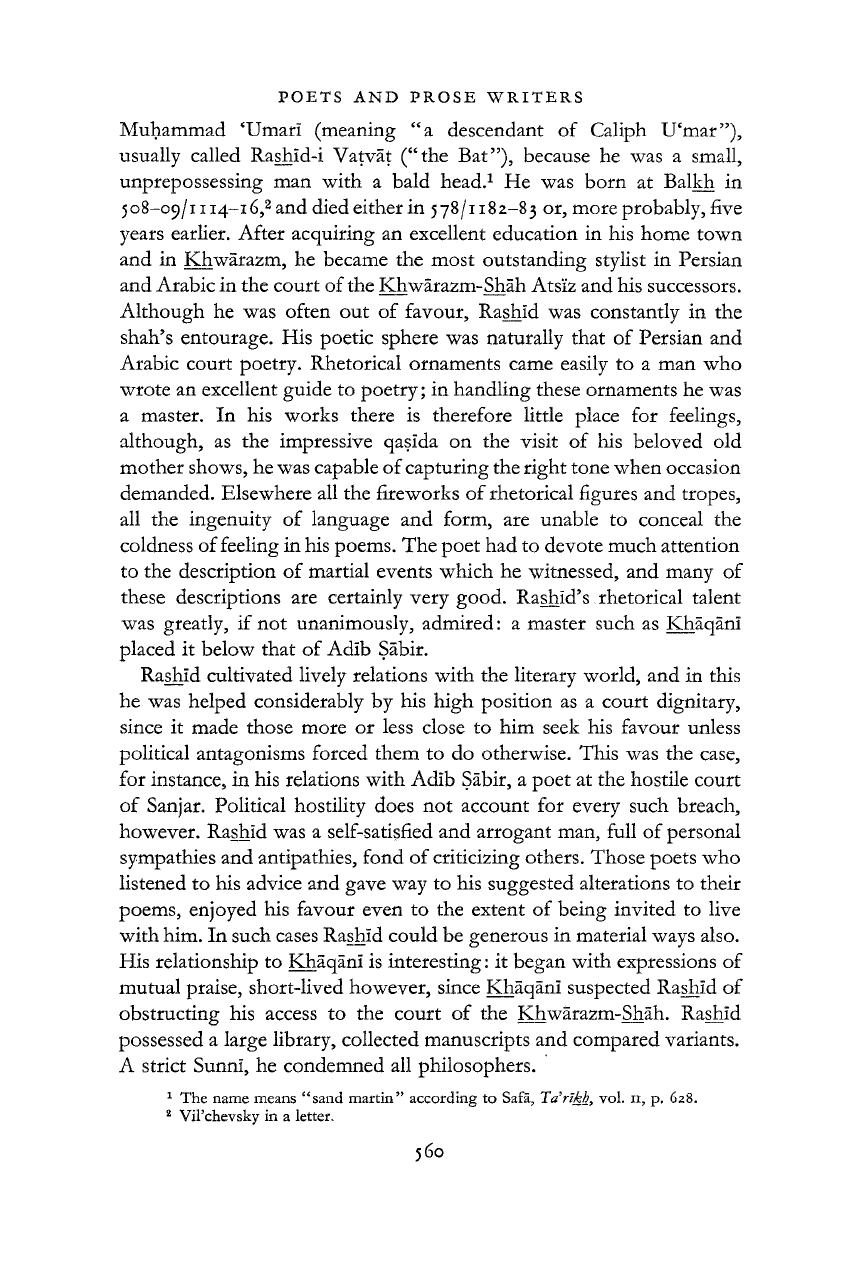
POETS AND PROSE WRITERS
560
Muhammad 'Umari (meaning "a descendant of Caliph U'mar"),
usually called Rashid-i Vatvāt ("the Bat"), because he was a small,
unprepossessing man with a bald head.
1
He was born at Balkh in
508-09/1114-16,2 and died either in 578/1182-83 or, more probably, five
years earlier. After acquiring an excellent education in his home town
and in Khwarazm, he became the most outstanding stylist in Persian
and Arabic in the court of the Khwarazm-Shāh Atsiz and his successors.
Although he was often out of favour, Rashid was constantly in the
shah's entourage. His poetic sphere was naturally that of Persian and
Arabic court poetry. Rhetorical ornaments came easily to a man who
wrote an excellent guide to poetry; in handling these ornaments he was
a master. In his works there is therefore little place for feelings,
although, as the impressive qasida on the visit of his beloved old
mother shows, he was capable of capturing the right tone when occasion
demanded. Elsewhere all the fireworks of rhetorical figures and tropes,
all the ingenuity of language and form, are unable to conceal the
coldness of feeling in his poems. The poet had to devote much attention
to the description of martial events which he witnessed, and many of
these descriptions are certainly very good. Rashid's rhetorical talent
was greatly, if not unanimously, admired: a master such as Khāgāni
placed it below that of Adib Sābir.
Rashid cultivated lively relations with the literary world, and in this
he was helped considerably by his high position as a court dignitary,
since it made those more or less close to him seek his favour unless
political antagonisms forced them to do otherwise. This was the case,
for instance, in his relations with Adib Sābir, a poet at the hostile court
of San jar. Political hostility does not account for every such breach,
however. Rashid was a self-satisfied and arrogant man, full of personal
sympathies and antipathies, fond of criticizing others. Those poets who
listened to his advice and gave way to his suggested alterations to their
poems, enjoyed his favour even to the extent of being invited to live
with him. In such cases Rashid could be generous in material ways also.
His relationship to Khāgāni is interesting: it began with expressions of
mutual praise, short-lived however, since Khāgāni suspected Rashid of
obstructing his access to the court of the Khwārazm-Shāh. Rashid
possessed a large library, collected manuscripts and compared variants.
A strict Sunni, he condemned all philosophers.
1
The name means "sand martin" according to Safā, Ta'rīkb, vol. 11, p. 628.
2
Vil'chevsky in a letter,
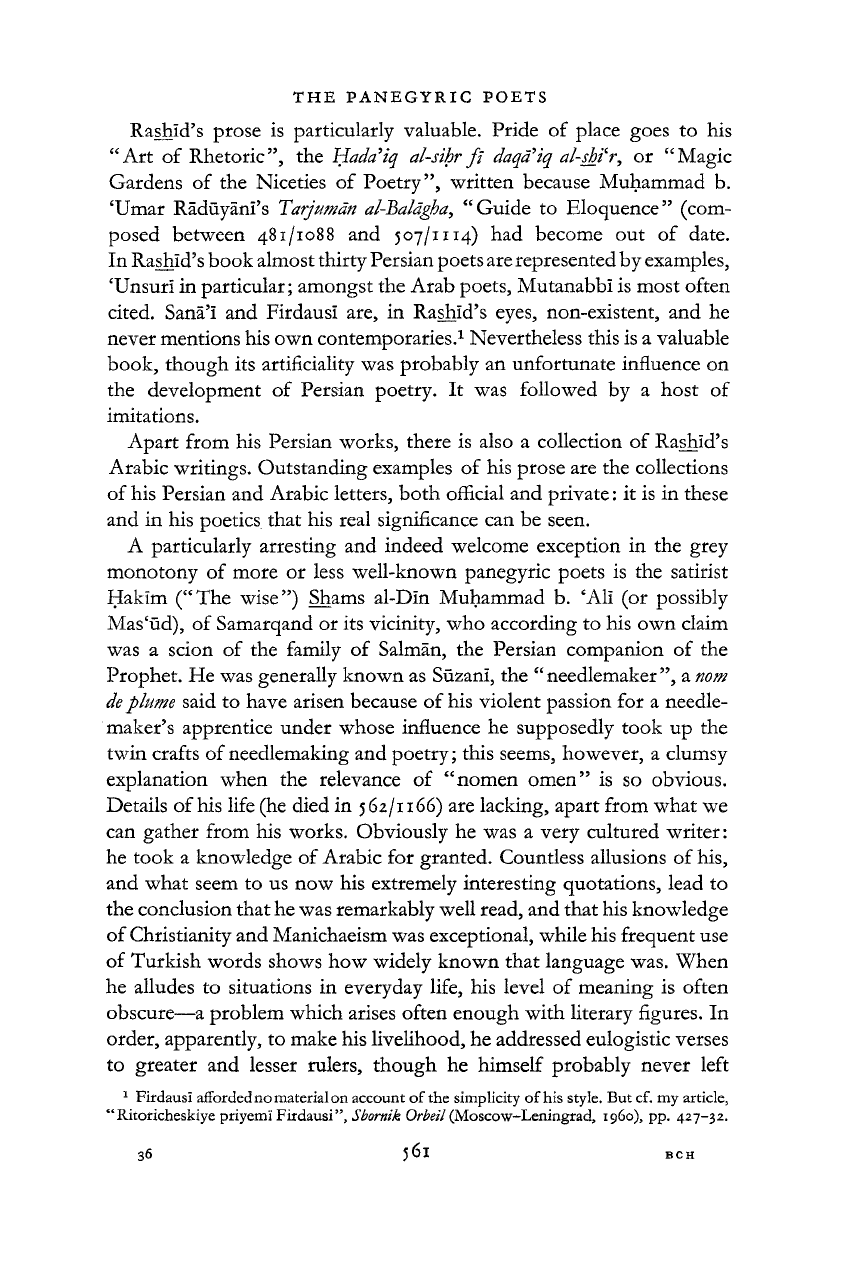
THE PANEGYRIC POETS
BCH
Rashid's prose
is
particularly valuable. Pride
of
place goes
to his
"Art
of
Rhetoric",
the Hada'iq al-sihr fi daqďiq
al֊shťr,
or
"Magic
Gardens
of the
Niceties
of
Poetry", written because Muhammad
b.
ť
Umar Raduyani's
Tarjuman al-Baldgha,
"Guide
to
Eloquence" (com-
posed between 481/1088
and
507/1114)
had
become
out of
date.
In Rashid's book almost thirty Persian poets are represented
by
examples,
ť
Unsuri
in
particular; amongst the Arab poets, Mutanabbi
is
most often
cited. Sana'i
and
Firdausi
are, in
Rashid's eyes, non-existent,
and he
never mentions his own contemporaries.
1
Nevertheless this
is a
valuable
book, though
its
artificiality
was
probably
an
unfortunate influence
on
the development
of
Persian poetry.
It was
followed
by a
host
of
imitations.
Apart from
his
Persian works, there
is
also
a
collection
of
Rashid's
Arabic writings. Outstanding examples
of his
prose
are the
collections
of his Persian
and
Arabic letters, both official
and
private:
it is in
these
and
in his
poetics that
his
real significance
can be
seen.
A particularly arresting
and
indeed welcome exception
in the
grey
monotony
of
more
or
less well-known panegyric poets
is the
satirist
Hakim
("The
wise") Shams al-Din Muhammad
b. 'All (or
possibly
Mas'ud),
of
Samarqand
or its
vicinity,
who
according
to his own
claim
was
a
scion
of the
family
of
Salman,
the
Persian companion
of the
Prophet.
He
was generally known
as
Suzani,
the "
needlemaker ",
a nom
de plume
said
to
have arisen because
of
his violent passion
for a
needle-
maker's apprentice under whose influence
he
supposedly took
up the
twin crafts
of
needlemaking and poetry; this seems, however,
a
clumsy
explanation when
the
relevance
of
"nomen omen"
is so
obvious.
Details
of
his life (he died
in
562/1166)
are
lacking, apart from what
we
can gather from
his
works. Obviously
he was a
very cultured writer:
he took
a
knowledge
of
Arabic
for
granted. Countless allusions
of
his,
and what seem
to us now his
extremely interesting quotations, lead
to
the conclusion that he was remarkably well read, and that his knowledge
of Christianity and Manichaeism was exceptional, while his frequent use
of Turkish words shows
how
widely known that language was. When
he alludes
to
situations
in
everyday life,
his
level
of
meaning
is
often
obscure—a problem which arises often enough with literary figures.
In
order, apparently,
to
make his livelihood,
he
addressed eulogistic verses
to greater
and
lesser rulers, though
he
himself probably never left
1
Firdausi afforded
no material on
account
of
the simplicity
of
his
style. But
cf.
my article,
"Ritoricheskiye priyem'i Firdausi", Sborník Orbeil (Moscow-Leningrad, i960), pp. 427-32.
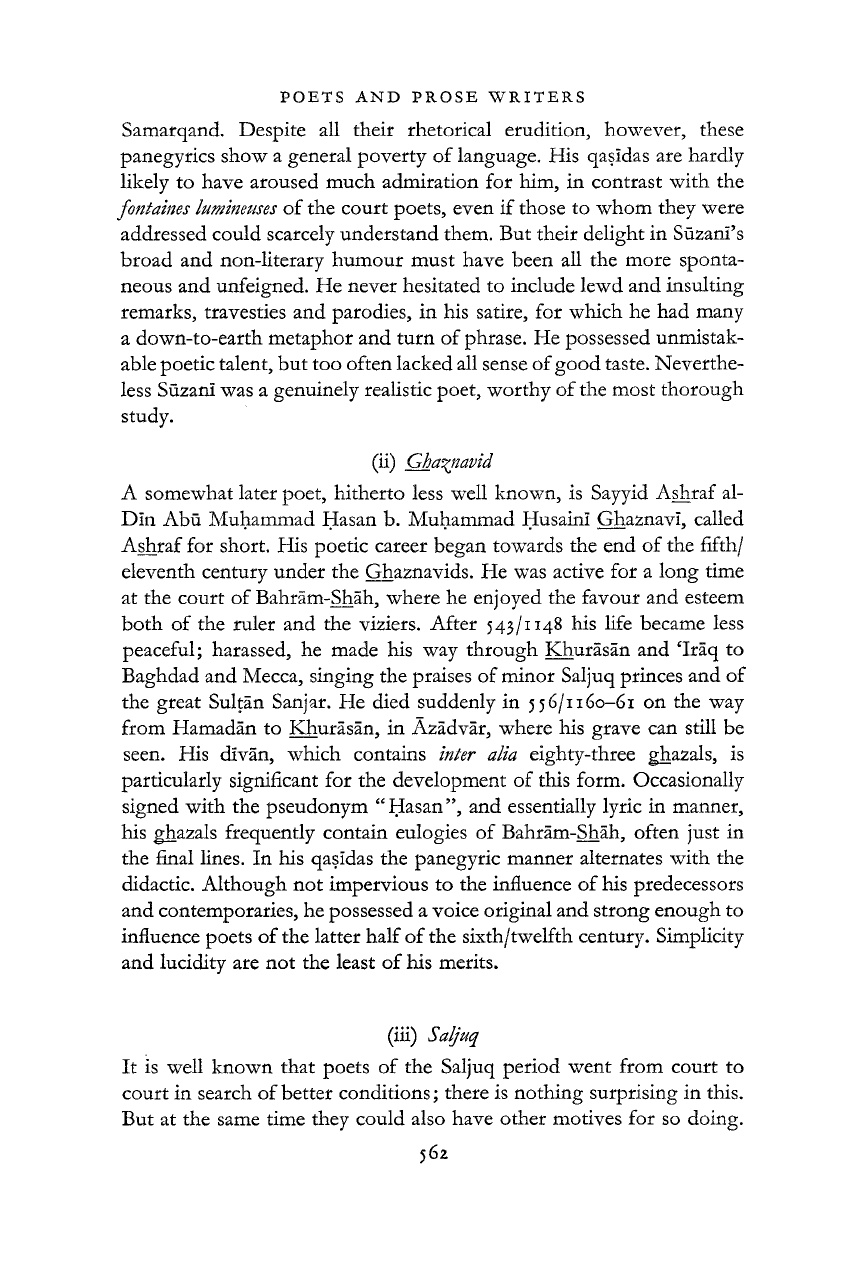
POETS
AND
PROSE WRITERS
Samarqand. Despite
all
their rhetorical erudition, however, these
panegyrics show
a
general poverty
of
language.
His
qasidas
are
hardly
likely
to
have aroused much admiration
for him, in
contrast with
the
fontaines lumineuses of
the court poets, even
if
those
to
whom they were
addressed could scarcely understand them.
But
their delight
in
Sudani's
broad
and
non-literary humour must have been
all the
more sponta-
neous
and
unfeigned.
He
never hesitated
to
include lewd
and
insulting
remarks, travesties
and
parodies,
in his
satire,
for
which
he had
many
a down-to-earth metaphor
and
turn
of
phrase.
He
possessed unmistak-
able poetic talent,
but
too often lacked all sense
of
good taste. Neverthe-
less Suzani was
a
genuinely realistic poet, worthy
of
the most thorough
study.
(ii)
Gha^navid
A somewhat later poet, hitherto less well known,
is
Sayyid Ashraf
al-
Din
Abu.
Muhammad Hasan
b.
Muhammad Husaini Ghaznavi, called
Ashraf
for
short.
His
poetic career began towards
the end of
the fifth/
eleventh century under
the
Ghaznavids.
He was
active
for a
long time
at
the
court
of
Bahram-Shah, where
he
enjoyed
the
favour
and
esteem
both
of the
ruler
and the
viziers. After 543/1148
his
life became less
peaceful; harassed,
he
made
his way
through Khurasan
and
"Iraq
to
Baghdad
and
Mecca, singing
the
praises
of
minor Saljuq princes
and of
the great Sultan San jar.
He
died suddenly
in
5 5
6/1160-61
on the way
from Hamadan
to
Khurasan,
in
Azadvar, where
his
grave
can
still
be
seen.
His
divan, which contains
inter alia
eighty-three ghazals,
is
particularly significant
for the
development
of
this form. Occasionally
signed with
the
pseudonym
"
Hasan",
and
essentially lyric
in
manner,
his ghazals frequently contain eulogies
of
Bahram-Shah, often just
in
the final lines.
In his
qasidas
the
panegyric manner alternates with
the
didactic. Although
not
impervious
to the
influence
of
his predecessors
and contemporaries,
he
possessed
a
voice original and strong enough
to
influence poets
of
the latter half
of
the sixth/twelfth century. Simplicity
and lucidity
are not the
least
of
his merits.
(iii)
Saljuq
It
is
well known that poets
of the
Saljuq period went from court
to
court
in
search
of
better conditions; there
is
nothing surprising
in
this.
But
at the
same time they could also have other motives
for so
doing.
562
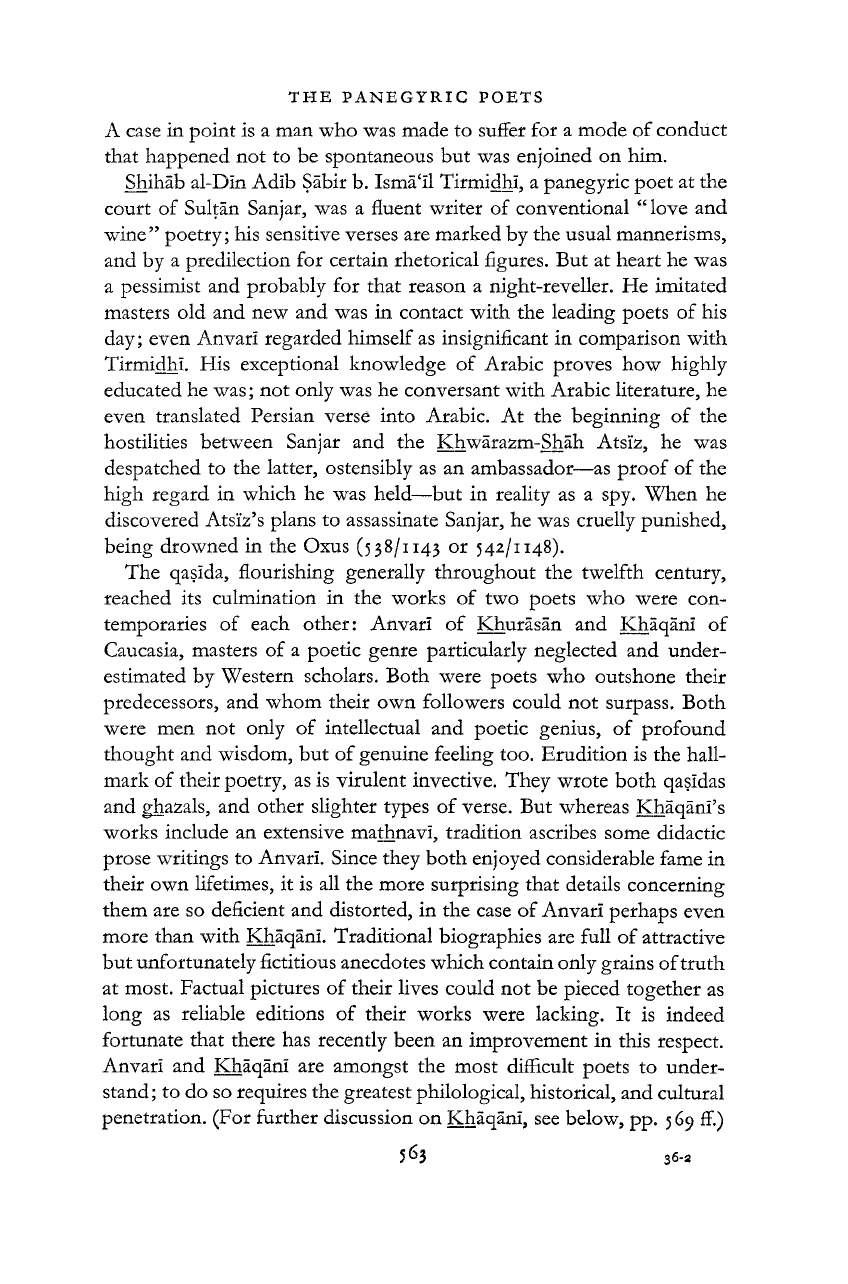
THE PANEGYRIC POETS
A case in point is a man who was made to suffer for a mode of conduct
that happened not to be spontaneous but was enjoined on him.
Shihab al-Din Adib Sabir b. Isma'il Tirmidhi, a panegyric poet at the
court of Sultan Sanjar, was a fluent writer of conventional " love and
wine " poetry; his sensitive verses are marked by the usual mannerisms,
and by a predilection for certain rhetorical figures. But at heart he was
a pessimist and probably for that reason a night-reveller. He imitated
masters old and new and was in contact with the leading poets of his
day; even Anvari regarded himself as insignificant in comparison with
Tirmidhi. His exceptional knowledge of Arabic proves how highly
educated he was; not only was he conversant with Arabic literature, he
even translated Persian verse into Arabic. At the beginning of the
hostilities between San jar and the Khwarazm-Shah Atsiz, he was
despatched to the latter, ostensibly as an ambassador—as proof of the
high regard in which he was held—but in reality as a spy. When he
discovered Atsiz's plans to assassinate Sanjar, he was cruelly punished,
being drowned in the Oxus (538/1143 or 542/1148).
The qasida, flourishing generally throughout the twelfth century,
reached its culmination in the works of two poets who were con-
temporaries of each other: Anvari of Khurasan and Khaqani of
Caucasia, masters of a poetic genre particularly neglected and under-
estimated by Western scholars. Both were poets who outshone their
predecessors, and whom their own followers could not surpass. Both
were men not only of intellectual and poetic genius, of profound
thought and wisdom, but of genuine feeling too. Erudition is the hall-
mark of their poetry, as is virulent invective. They wrote both qasidas
and ghazals, and other slighter types of verse. But whereas Khaqani's
works include an extensive mathnavi, tradition ascribes some didactic
prose writings to Anvari. Since they both enjoyed considerable fame in
their own lifetimes, it is all the more surprising that details concerning
them are so deficient and distorted, in the case of Anvari perhaps even
more than with Khaqani. Traditional biographies are full of attractive
but unfortunately fictitious anecdotes which contain only grains of truth
at most. Factual pictures of their lives could not be pieced together as
long as reliable editions of their works were lacking. It is indeed
fortunate that there has recently been an improvement in this respect.
Anvari and Khaqani are amongst the most difficult poets to under-
stand; to do so requires the greatest philological, historical, and cultural
penetration. (For further discussion on Khaqani, see below, pp. 569 ff.)
5^3 36-2
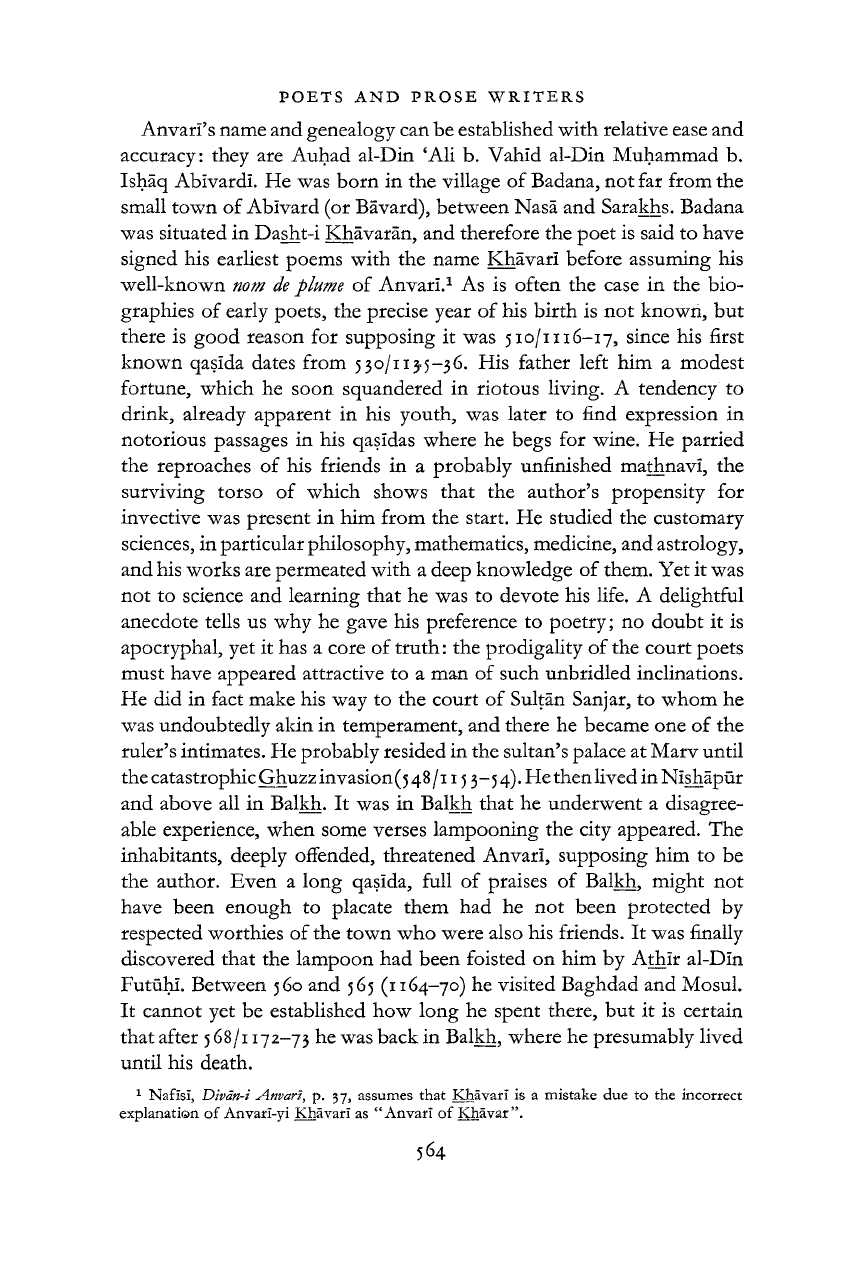
POETS AND PROSE WRITERS
564
Anvarf s name and genealogy can be established with relative ease and
accuracy: they are Auhad al-Din
c
Ali b. Vahid al-Din Muhammad b.
Ishäq Abivardi. He was born in the village of Badana, not far from the
small town of Abivard (or
Bävard), between Nasä and Sarakhs. Badana
was situated in Dasht-i Khävarän, and therefore the poet is said to have
signed his earliest poems with the name Khävari before assuming his
well-known nom de
plume
of An van.
1
As is often the case in the bio-
graphies of early poets, the precise year of his birth is not known, but
there is good reason for supposing it was 510/1116-17, since his first
known qasida dates from
5
30/113.5-36. His father left him a modest
fortune, which he soon squandered in riotous living. A tendency to
drink, already apparent in his youth, was later to find expression in
notorious passages in his qasidas where he begs for wine. He parried
the reproaches of his friends in a probably unfinished mathnavi, the
surviving torso of which shows that the author's propensity for
invective was present in him from the start. He studied the customary
sciences, in particular philosophy, mathematics, medicine, and astrology,
and his works are permeated with a deep knowledge of them. Yet it was
not to science and learning that he was to devote his life. A delightful
anecdote tells us why he gave his preference to poetry; no doubt it is
apocryphal, yet it has a core of truth: the prodigality of the court poets
must have appeared attractive to a man of such unbridled inclinations.
He did in fact make his way to the court of
Sultan Sanjar, to whom he
was undoubtedly akin in temperament, and there he became one of the
ruler's intimates. He probably resided in the sultan's palace at Marv until
the catastrophic Ghuzz invasion (548/1153-54). He then lived in
Nishäpür
and above all in Balkh. It was in Balkh that he underwent a disagree-
able experience, when some verses lampooning the city appeared. The
inhabitants, deeply offended, threatened Anvari, supposing him to be
the author. Even a long qasida, full of praises of Balkh, might not
have been enough to placate them had he not been protected by
respected worthies of the town who were also his friends. It was finally
discovered that the lampoon had been foisted on him by Athir al-Din
Futühi. Between 560 and 565 (1164-70) he visited Baghdad and Mosul.
It cannot yet be established how long he spent there, but it is certain
that after
5
68/1172-73 he was back in Balkh, where he presumably lived
until his death.
1
Nafisi, Divän-i Anvari, p. 37, assumes that Khävari is a mistake due to the incorrect
explanation of Anvari-yi Khävari as "Anvari of Khävar".
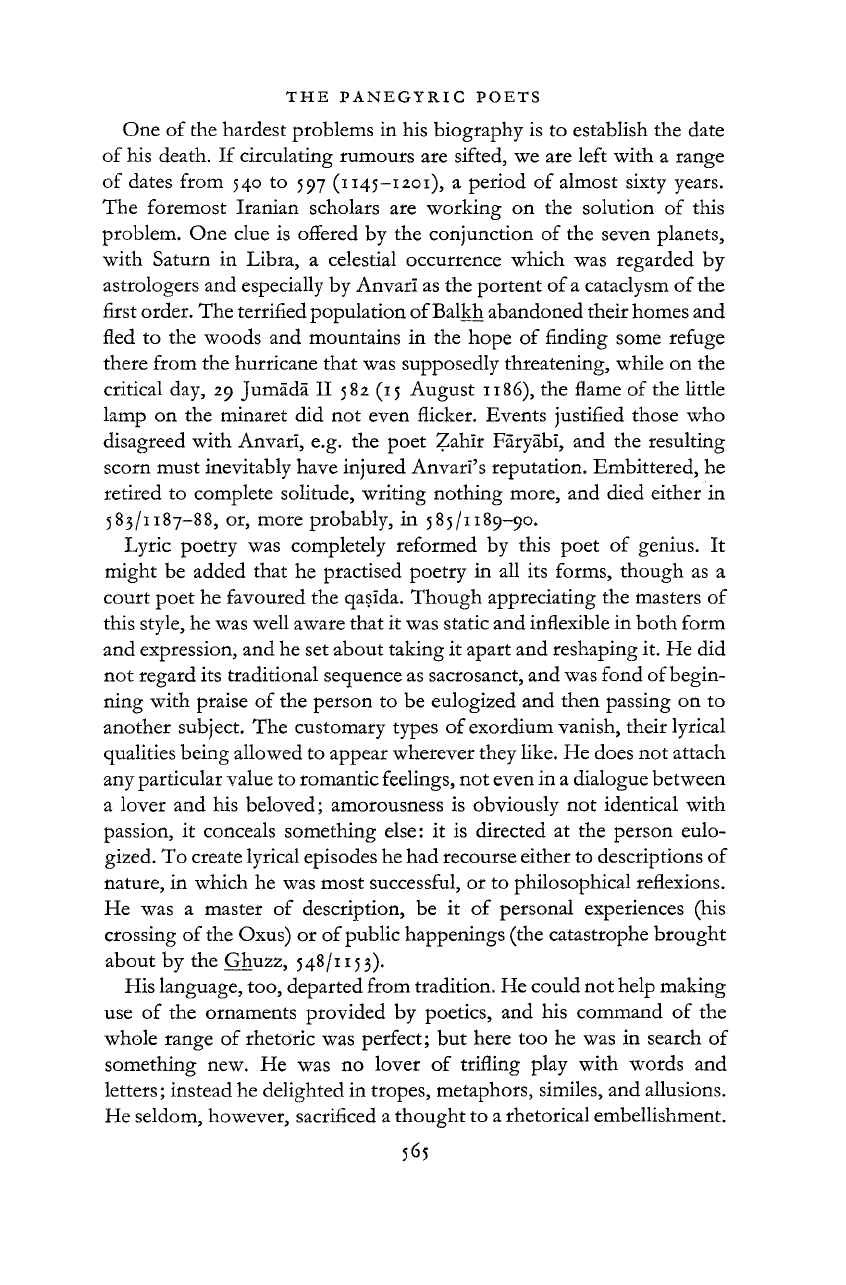
THE PANEGYRIC POETS
565
One of the hardest problems in his biography is to establish the date
of his death. If circulating rumours are sifted, we are left with a range
of dates from 540 to 597 (1145-1201), a period of almost sixty years.
The foremost Iranian scholars are working on the solution of this
problem. One clue is offered by the conjunction of the seven planets,
with Saturn in Libra, a celestial occurrence which was regarded by
astrologers and especially by Anvari as the portent of a cataclysm of the
first order. The terrified population of Balkh abandoned their homes and
fled to the woods and mountains in the hope of finding some refuge
there from the hurricane that was supposedly threatening, while on the
critical day, 29 Jumādā II 582 (15 August 1186), the flame of the little
lamp on the minaret did not even flicker. Events justified those who
disagreed with Anvari, e.g. the poet Zahir Faryabi, and the resulting
scorn must inevitably have injured Anvari's reputation. Embittered, he
retired to complete solitude, writing nothing more, and died either in
583/1187-88, or, more probably, in 585/1189-90.
Lyric poetry was completely reformed by this poet of genius. It
might be added that he practised poetry in all its forms, though as a
court poet he favoured the qasida. Though appreciating the masters of
this style, he was well aware that it was static and inflexible in both form
and expression, and he set about taking it apart and reshaping it. He did
not regard its traditional sequence as sacrosanct, and was fond of begin-
ning with praise of the person to be eulogized and then passing on to
another subject. The customary types of exordium vanish, their lyrical
qualities being allowed to appear wherever they like. He does not attach
any particular value to romantic feelings, not even in a dialogue between
a lover and his beloved; amorousness is obviously not identical with
passion, it conceals something else: it is directed at the person eulo-
gized. To create lyrical episodes he had recourse either to descriptions of
nature, in which he was most successful, or to philosophical reflexions.
He was a master of description, be it of personal experiences (his
crossing of the Oxus) or of public happenings (the catastrophe brought
about by the Ghuzz, 548/1153).
His language, too, departed from tradition. He could not help making
use of the ornaments provided by poetics, and his command of the
whole range of rhetoric was perfect; but here too he was in search of
something new. He was no lover of trifling play with words and
letters; instead he delighted in tropes, metaphors, similes, and allusions.
He seldom, however, sacrificed a thought to a rhetorical embellishment.
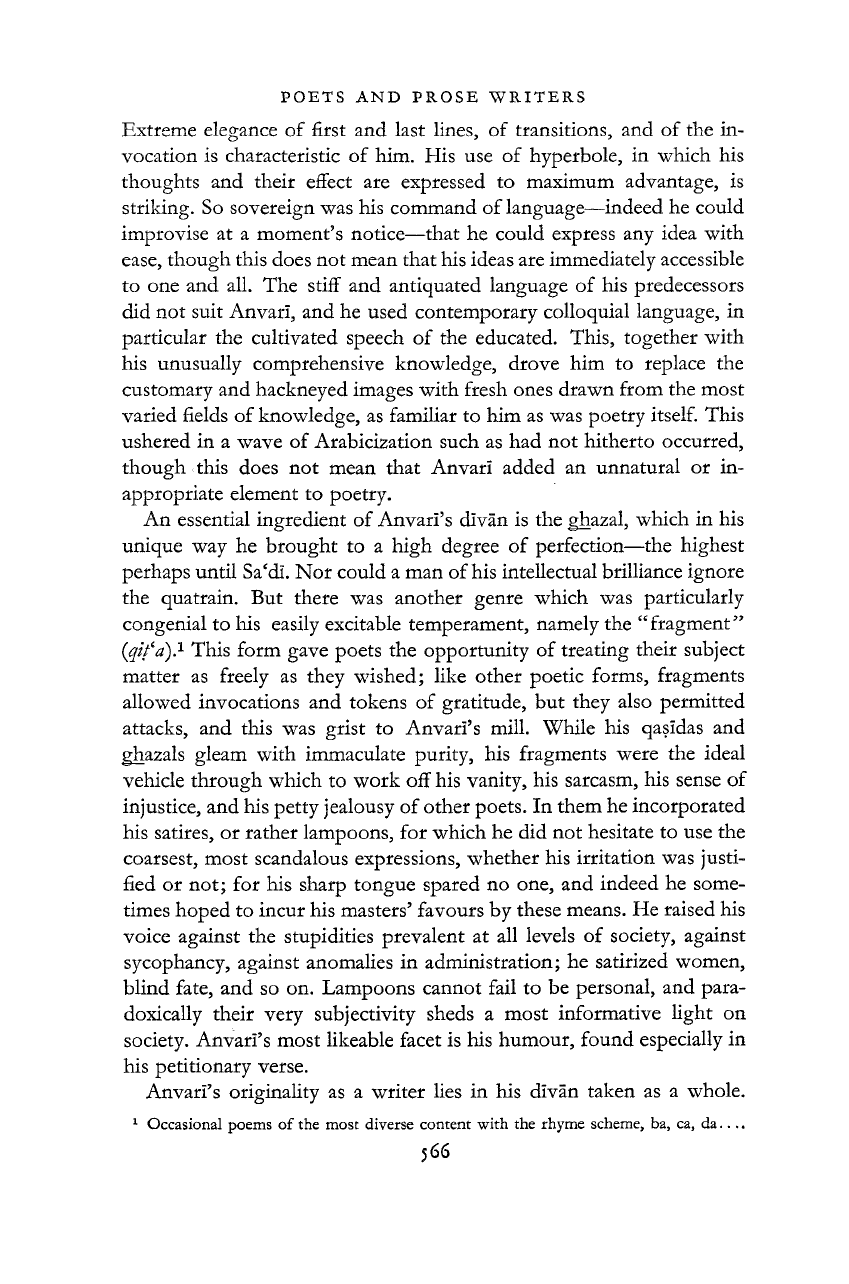
POETS AND PROSE WRITERS
566
Extreme elegance of first and last lines, of transitions, and of the in-
vocation is characteristic of him. His use of hyperbole, in which his
thoughts and their effect are expressed to maximum advantage, is
striking. So sovereign was his command of language—indeed he could
improvise at a moment's notice—that he could express any idea with
ease, though this does not mean that his ideas are immediately accessible
to one and all. The stiff and antiquated language of his predecessors
did not suit Anvari, and he used contemporary colloquial language, in
particular the cultivated speech of the educated. This, together with
his unusually comprehensive knowledge, drove him to replace the
customary and hackneyed images with fresh ones drawn from the most
varied fields of knowledge, as familiar to him as was poetry
itself.
This
ushered in a wave of Arabicization such as had not hitherto occurred,
though this does not mean that Anvari added an unnatural or in-
appropriate element to poetry.
An essential ingredient of Anvari's divan is the ghazal, which in his
unique way he brought to a high degree of perfection—the highest
perhaps until Sa'di. Nor could a man of his intellectual brilliance ignore
the quatrain. But there was another genre which was particularly
congenial to his easily excitable temperament, namely the "fragment"
(qifa).
1
This form gave poets the opportunity of treating their subject
matter as freely as they wished; like other poetic forms, fragments
allowed invocations and tokens of gratitude, but they also permitted
attacks, and this was grist to Anvari's mill. While his qasidas and
ghazals gleam with immaculate purity, his fragments were the ideal
vehicle through which to work off his vanity, his sarcasm, his sense of
injustice, and his petty jealousy of other poets. In them he incorporated
his satires, or rather lampoons, for which he did not hesitate to use the
coarsest, most scandalous expressions, whether his irritation was justi-
fied or not; for his sharp tongue spared no one, and indeed he some-
times hoped to incur his masters' favours by these means. He raised his
voice against the stupidities prevalent at all levels of society, against
sycophancy, against anomalies in administration; he satirized women,
blind fate, and so on. Lampoons cannot fail to be personal, and para-
doxically their very subjectivity sheds a most informative light on
society. Anvari's most likeable facet is his humour, found especially in
his petitionary verse.
Anvari's originality as a writer lies in his divan taken as a whole.
1
Occasional poems of the most diverse content with the rhyme scheme, ba, ca, da....
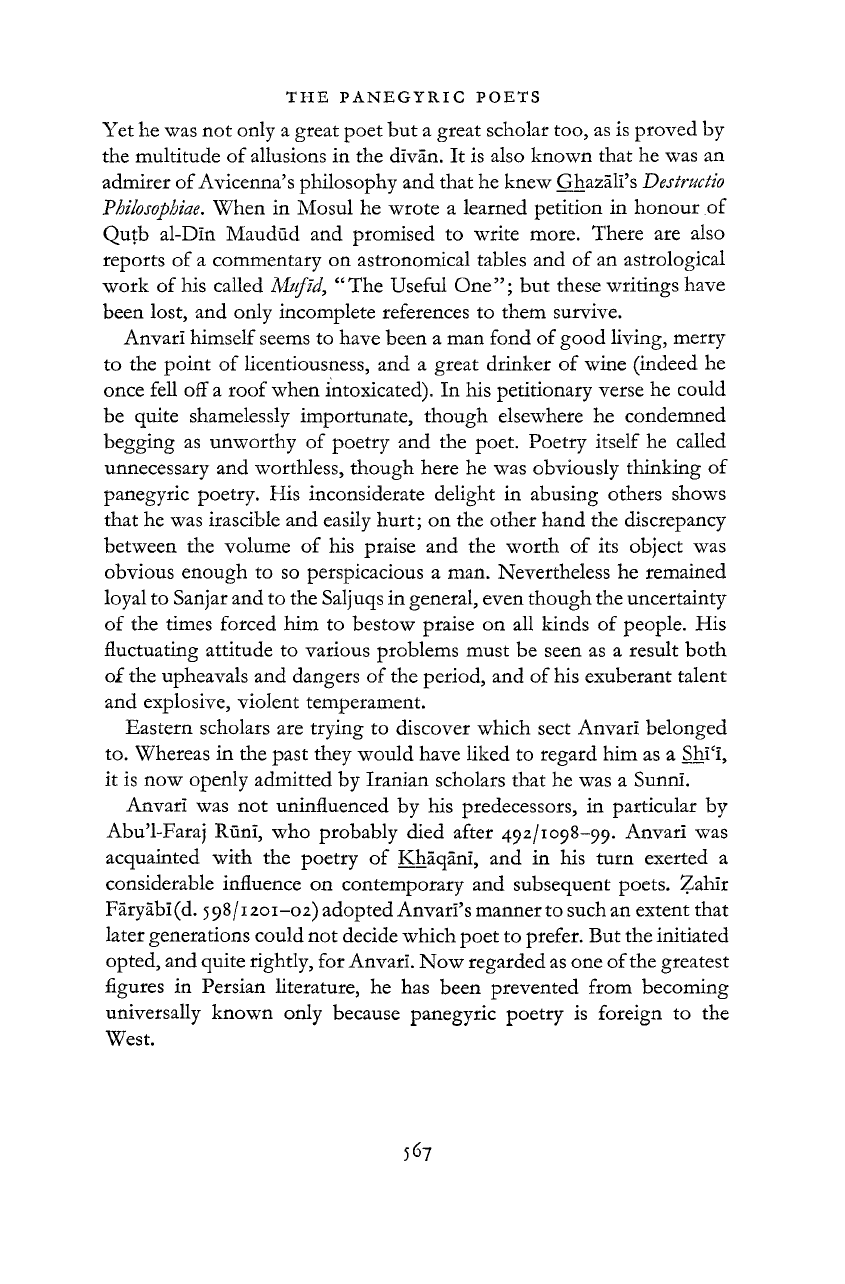
THE PANEGYRIC POETS
567
Yet
he
was
not
only
a
great poet but
a
great scholar too,
as is
proved
by
the multitude
of
allusions
in the
divan.
It is
also known that
he was an
admirer
of
Avicenna's philosophy and that
he
knew Ghazaii's
Destructio
Philosophiae.
When
in
Mosul
he
wrote
a
learned petition
in
honour
of
Qutb al-Din Maudüd
and
promised
to
write more. There
are
also
reports
of a
commentary
on
astronomical tables
and of
an astrological
work
of
his called
Mufid,
"The
Useful One";
but
these writings have
been lost,
and
only incomplete references
to
them survive.
Anvari himself seems
to
have been
a
man fond
of
good living, merry
to
the
point
of
licentiousness,
and a
great drinker
of
wine (indeed
he
once fell
off a
roof when intoxicated).
In his
petitionary verse
he
could
be quite shamelessly importunate, though elsewhere
he
condemned
begging
as
unworthy
of
poetry
and the
poet. Poetry itself
he
called
unnecessary
and
worthless, though here
he was
obviously thinking
of
panegyric poetry.
His
inconsiderate delight
in
abusing others shows
that
he was
irascible
and
easily hurt;
on the
other hand
the
discrepancy
between
the
volume
of his
praise
and the
worth
of its
object
was
obvious enough
to so
perspicacious
a
man. Nevertheless
he
remained
loyal
to
Sanjar and
to
the Saljuqs
in
general, even though the uncertainty
of
the
times forced
him to
bestow praise
on all
kinds
of
people.
His
fluctuating attitude
to
various problems must
be
seen
as a
result both
of the upheavals
and
dangers
of
the period,
and of
his exuberant talent
and explosive, violent temperament.
Eastern scholars
are
trying
to
discover which sect Anvari belonged
to.
Whereas
in the
past they would have liked
to
regard
him as a
Shi'i,
it
is now
openly admitted
by
Iranian scholars that
he was a
Sunni.
Anvari
was not
uninfluenced
by his
predecessors,
in
particular
by
Abu'l-Faraj Rüni,
who
probably died after 492/1098-99. Anvari
was
acquainted with
the
poetry
of
Khäqäni,
and in his
turn exerted
a
considerable influence
on
contemporary
and
subsequent poets. Zahir
Färyäbi
(d.
598/1201-02) adopted Anvari's manner to such an extent that
later generations could not decide which poet
to
prefer. But the initiated
opted, and quite rightly,
for
Anvari.
Now
regarded as one of the greatest
figures in Persian literature,
he has
been prevented from becoming
universally known only because panegyric poetry
is
foreign
to the
West.
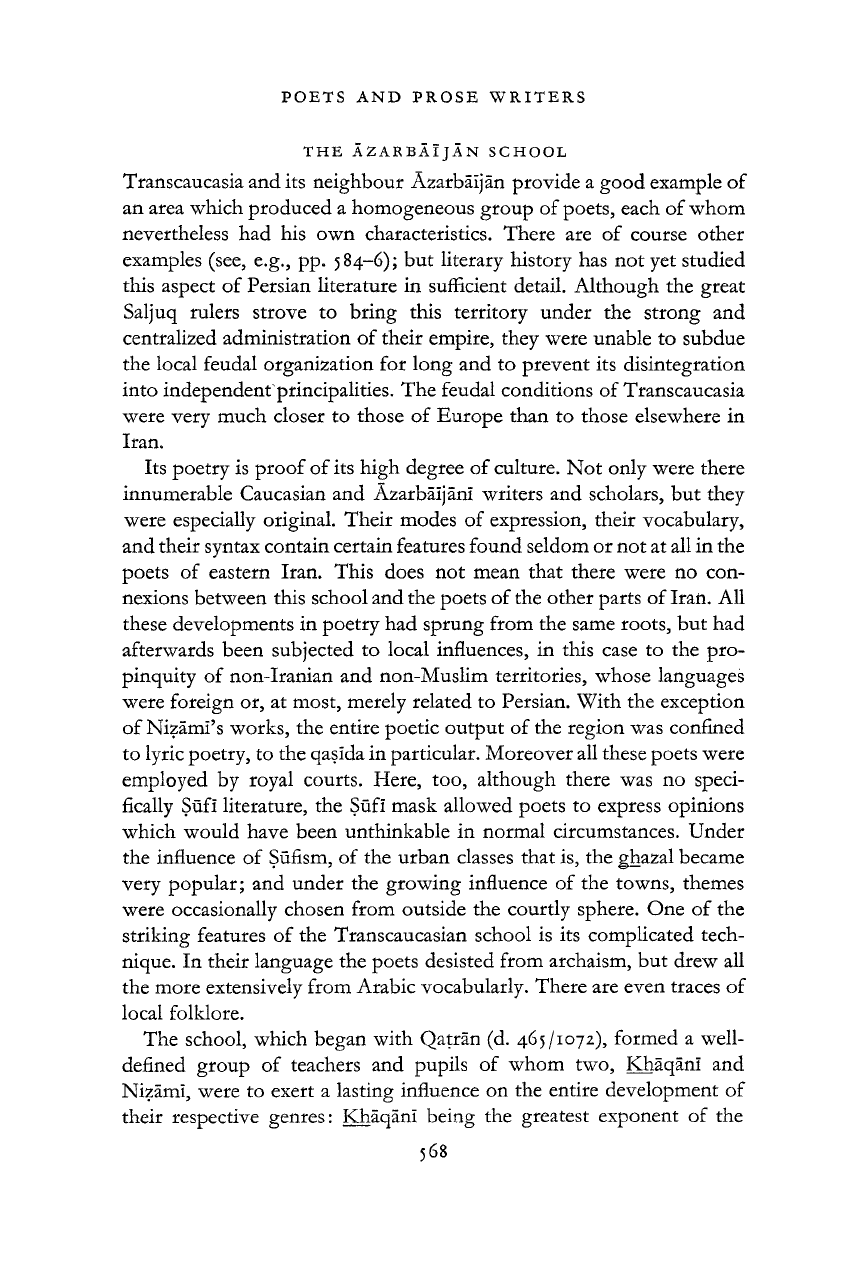
POETS AND PROSE WRITERS
THE AZARBAIJAN SCHOOL
Transcaucasia and its neighbour Azarbaijan provide a good example of
an area which produced a homogeneous group of poets, each of whom
nevertheless had his own characteristics. There are of course other
examples (see, e.g., pp. 584-6); but literary history has not yet studied
this aspect of Persian literature in sufficient detail. Although the great
Saljuq rulers strove to bring this territory under the strong and
centralized administration of their empire, they were unable to subdue
the local feudal organization for long and to prevent its disintegration
into independent principalities. The feudal conditions of Transcaucasia
were very much closer to those of Europe than to those elsewhere in
Iran.
Its poetry is proof of its high degree of culture. Not only were there
innumerable Caucasian and Azarbaijani writers and scholars, but they
were especially original. Their modes of expression, their vocabulary,
and their syntax contain certain features found seldom or not at all in the
poets of eastern Iran. This does not mean that there were no con-
nexions between this school and the poets of the other parts of Iran. All
these developments in poetry had sprung from the same roots, but had
afterwards been subjected to local influences, in this case to the pro-
pinquity of non-Iranian and non-Muslim territories, whose languages
were foreign or, at most, merely related to Persian. With the exception
of Nizami's works, the entire poetic output of the region was confined
to lyric poetry, to the qasida in particular. Moreover all these poets were
employed by royal courts. Here, too, although there was no speci-
fically Sufi literature, the Sufi mask allowed poets to express opinions
which would have been unthinkable in normal circumstances. Under
the influence of Siifism, of the urban classes that is, the ghazal became
very popular; and under the growing influence of the towns, themes
were occasionally chosen from outside the courtly sphere. One of the
striking features of the Transcaucasian school is its complicated tech-
nique. In their language the poets desisted from archaism, but drew all
the more extensively from Arabic vocabularly. There are even traces of
local folklore.
The school, which began with Qatran (d. 465/1072), formed a well-
defined group of teachers and pupils of whom two, Khaqani and
Nizami, were to exert a lasting influence on the entire development of
their respective genres: Khaqani being the greatest exponent of the
568
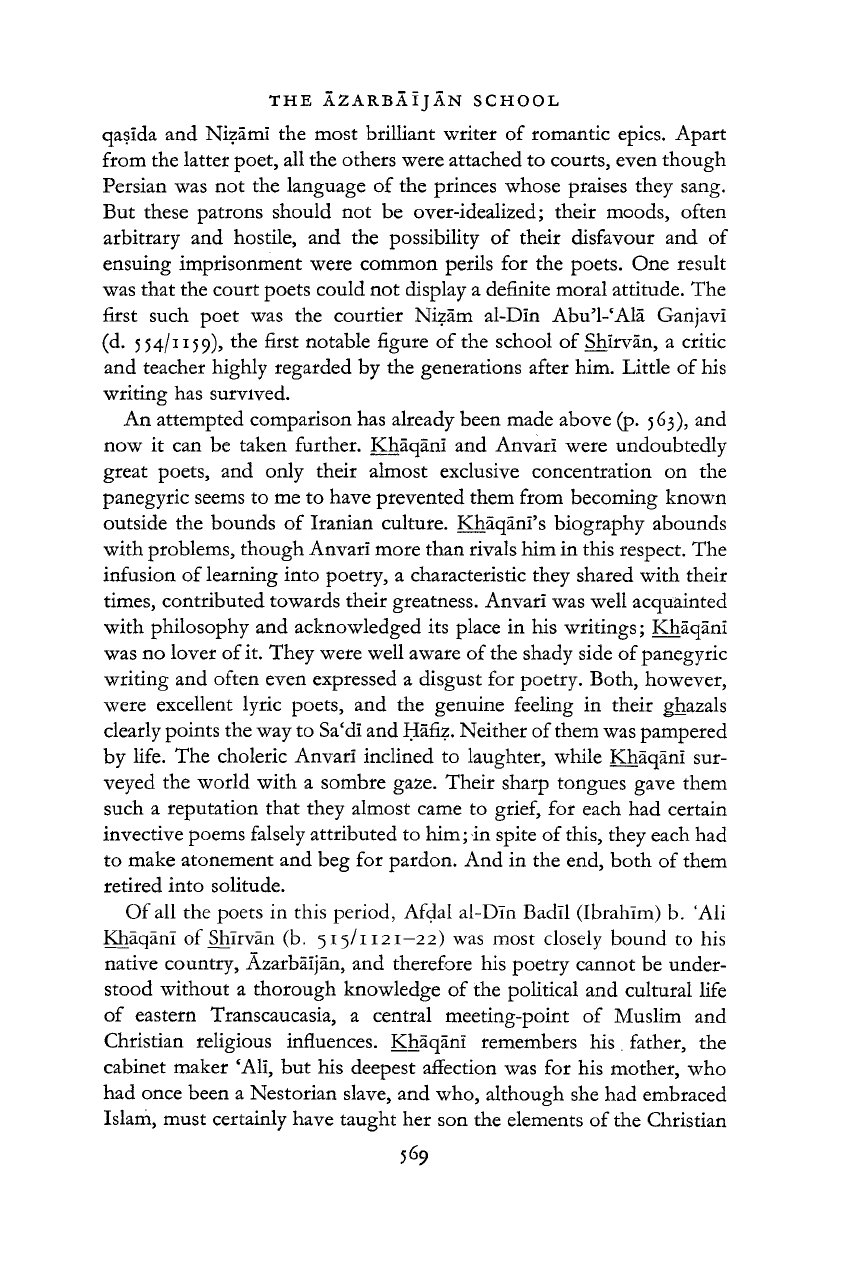
THE A2ARBAIJ AN SCHOOL
569
qasida and Nizami the most brilliant writer of romantic epics. Apart
from the latter poet, all the others were attached to courts, even though
Persian was not the language of the princes whose praises they sang.
But these patrons should not be over-idealized; their moods, often
arbitrary and hostile, and the possibility of their disfavour and of
ensuing imprisonment were common perils for the poets. One result
was that the court poets could not display a definite moral attitude. The
first such poet was the courtier Nizam al-Din Abu'l-'Ala Ganjavi
(d. 554/1159), the first notable figure of the school of Shirvan, a critic
and teacher highly regarded by the generations after him. Little of his
writing has survived.
An attempted comparison has already been made above (p. 563), and
now it can be taken further.
Khaqani and Anvari were undoubtedly
great poets, and only their almost exclusive concentration on the
panegyric seems to me to have prevented them from becoming known
outside the bounds of Iranian culture. Khaqani's biography abounds
with problems, though Anvari more than rivals him in this respect. The
infusion of learning into poetry, a characteristic they shared with their
times,
contributed towards their greatness. Anvari was well acquainted
with philosophy and acknowledged its place in his writings; Khaqani
was no lover of
it.
They were well aware of the shady side of panegyric
writing and often even expressed a disgust for poetry. Both, however,
were excellent lyric poets, and the genuine feeling in their ghazals
clearly points the way to Sa'di and Hafiz. Neither of them was pampered
by life. The choleric Anvari inclined to laughter, while Khaqani sur-
veyed the world with a sombre gaze. Their sharp tongues gave them
such a reputation that they almost came to
grief,
for each had certain
invective poems falsely attributed to him; in spite of this, they each had
to make atonement and beg for pardon. And in the end, both of them
retired into solitude.
Of all the poets in this period, Afdal al-Din Badll (Ibrahim) b. 'Ali
Khaqani of Shirvan (b. 515/1121-22) was most closely bound to his
native country, Azarbaijan, and therefore his poetry cannot be under-
stood without a thorough knowledge of the political and cultural life
of eastern Transcaucasia, a central meeting-point of Muslim and
Christian religious influences. Khaqani remembers his. father, the
cabinet maker
c
Ali, but his deepest affection was for his mother, who
had once been a Nestorian slave, and who, although she had embraced
Islam, must certainly have taught her son the elements of the Christian
